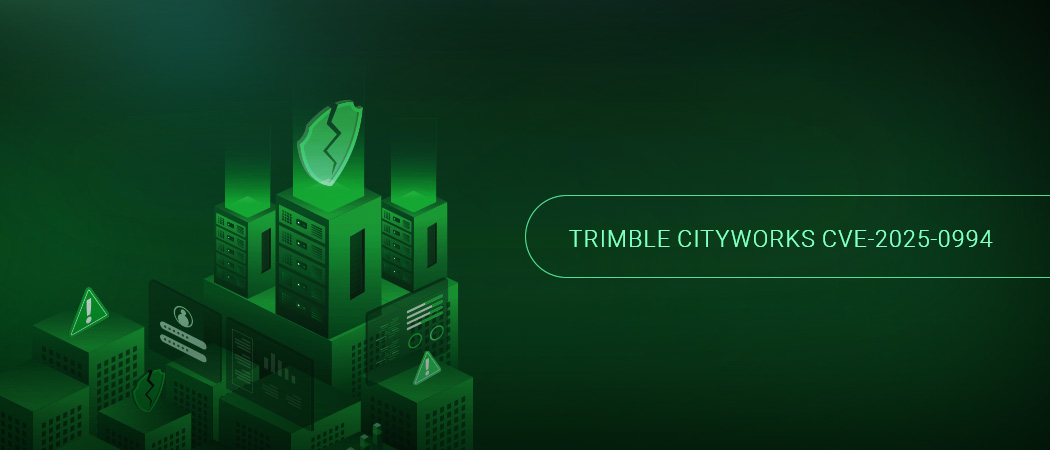Greenbone Detects CVE-2025-0994: Actively Exploited Flaw in Trimble Cityworks
Trimble Cityworks, an enterprise asset management (EAM) and public works management software is actively under attack. The campaign began as an unknown (zero-day) vulnerability, but is now tracked as CVE-2025-0994 with a CVSS of 8.6. The vulnerability is a deserialization flaw [CWE-502] that could allow an authenticated attacker to execute arbitrary code remotely (Remote Code Execution; RCE). Greenbone includes detection for CVE-2025-0994 in the Enterprise Feed.
Active exploitation of CVE-2025-0994 is a real and present danger. Trimble has released a statement acknowledging the attacks against their product. Thanks to the vendor’s transparency, CISA (Cybersecurity and Infrastructure Security Agency) has added CVE-2025-0994 to their catalog of Known Exploited Vulnerabilities (KEV), published an ICS advisory as well as a CSAF 2.0 document. CSAF 2.0 advisories are machine readable advisory documents for decentralized sharing of cybersecurity intelligence.
Although many media reports and some threat platforms indicate that a public proof-of-concept (PoC) exists, the only search result for GitHub is simply a version detection test. This means it is less likely that low-skilled hackers will easily participate in attacks. The misinformation is likely due to poorly designed algorithms combined with lack of human oversight before publishing threat intelligence.
Who Is at Risk due to CVE-2025-0994?
Trimble Cityworks is designed for and used primarily by local governments and critical infrastructure providers including water and wastewater systems, energy, transportation systems, government industrial facilities and communications agencies. Cityworks enhances Geographic Information Systems (GIS) by integrating asset management and public works solutions directly with Esri ArcGIS. The software is meant to help organizations manage infrastructure, schedule maintenance and improve operational efficiency. In addition to CISA, several other government agencies have issued alerts regarding this vulnerability including the US Environment Protection Agency (EPA), the Canadian Centre for Cyber Security and New York State.
Trimble Cityworks has reported serving over 700 customers across North America, Europe, Australia and the Middle East in 2019. While specific numbers for municipal governments in the U.S., Canada and the EU are not publicly disclosed, a Shodan search and Censys map both reveal only about 100 publicly exposed instances of Cityworks. However, the application is considered to have a high adoption rate by local governments and utilities. If publicly exposed, CVE-2025-0994 could offer an attacker initial access [T1190]. For attackers who already have a foothold, the flaw is an opportunity for lateral movement [TA0008] and presents an easy mark for insider attacks.
A Technical Description of CVE-2025-0994
CVE-2025-0994 is a deserialization vulnerability [CWE-502] found in versions of Trimble Cityworks prior to 15.8.9 and Cityworks with Office Companion versions prior to 23.10. The vulnerability arises from the improper deserialization of untrusted serialized data, allowing an authenticated attacker to execute arbitrary code remotely on a target’s Microsoft Internet Information Services (IIS) web server.
Serialization is a process whereby the software code or objects are encoded to be transferred between applications and then reconstructed into the original format used by a programming language. When Trimble Cityworks processes serialized objects, it does not properly validate or sanitize untrusted input. This flaw allows an attacker with authenticated access to send specially crafted serialized objects, which can trigger arbitrary code execution on the underlying IIS server. Deserializing data from unauthenticated sources seems like a significant design flaw in itself, but failing to properly sanitize serialized data is especially poor security.
Exploitation CVE-2025-0994 could lead to:
- Unauthorized access to sensitive data
- Service disruption of critical infrastructure systems
- Potential full system compromise of the affected IIS web server
Mitigating CVE-2025-0994 in Trimble Cityworks
Trimble has released patched versions of Cityworks that address the deserialization vulnerability. These patches include Cityworks 15.8.9 and Cityworks 23.10. On-premise users must immediately upgrade to the patched version, while Cityworks Online (CWOL) customers will receive these updates automatically.
Trimble noted that some on-premise deployments are running IIS with overprivileged identity permissions, which increases the attack surface. IIS should not have local or domain-level administrative privileges. Follow Trimble’s guidance in the latest Cityworks release notes to adjust IIS identity configurations properly.
Users of on-premises Trimble Cityworks should:
- Update Cityworks 15.x versions to 15.8.9 and 23.x versions to 23.10.
- Audit IIS identity permissions to ensure that they align with the principle of least privilege.
- Limit attachment directory root configuration to only folders which only contain attachments.
- Use a firewall to restrict IIS server access to trusted internal systems only.
- Use a VPN to allow remote access to Cityworks rather than publicly exposing the service.
Summary
CVE-2025-0994 represents a serious security risk to Trimble Cityworks users, which largely comprise government and critical infrastructure environments. With active exploitation already observed, organizations must prioritize immediate patching and implement security hardening measures to mitigate the risk. Greenbone has added detection for CVE-2025-0994 to the Enterprise Feed, allowing customers to gain visibility into their exposure.
Joseph has had a varied and passionate background in IT and cyber security since the late 1980s. His early technical experience included working on an IBM PS/2, assembling PCs and programming in C++.
He also pursued academic studies in computer and systems engineering, anthropology and an MBA in technology forecasting.
Joseph has worked in data analytics, software development and, in particular, enterprise IT security. He specialises in vulnerability management, encryption and penetration testing.




